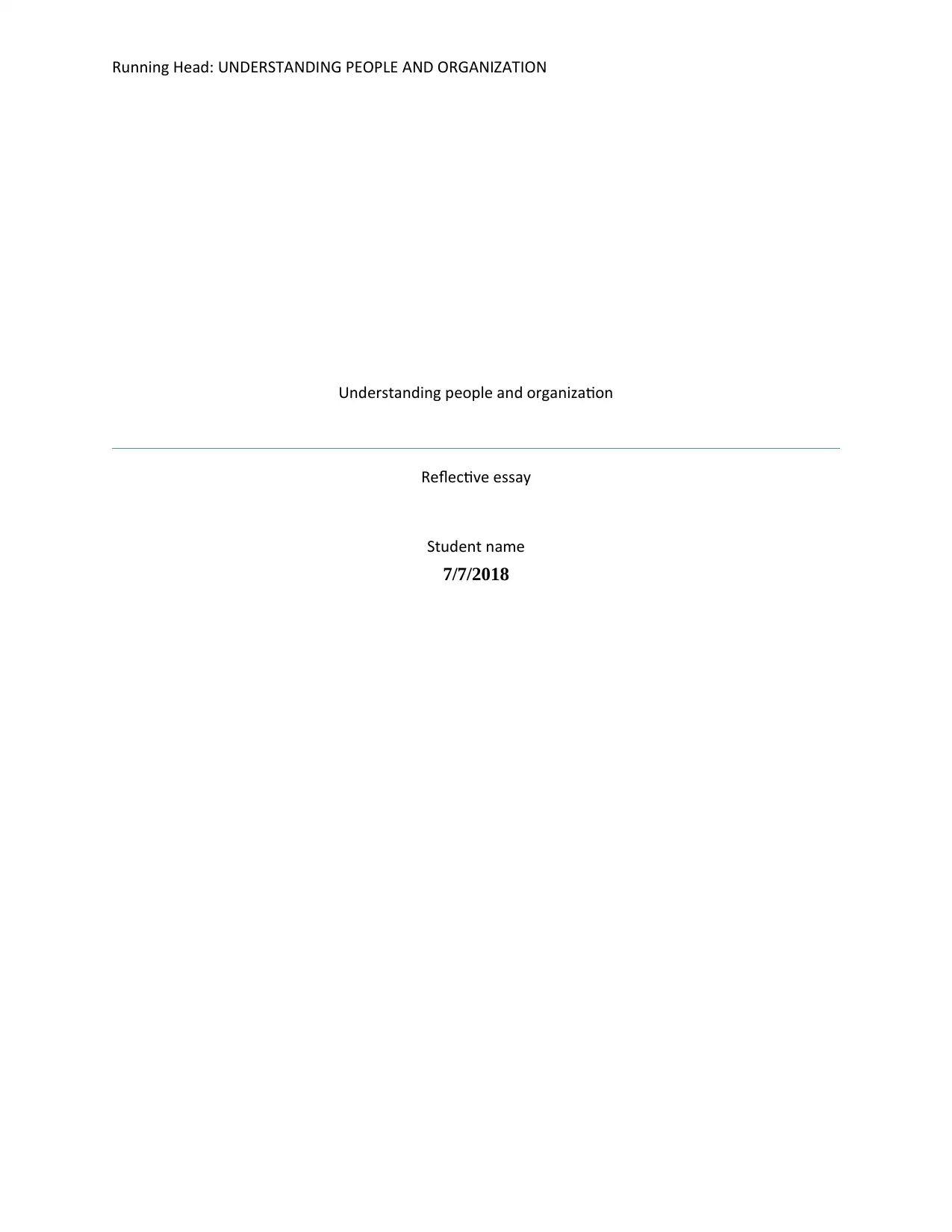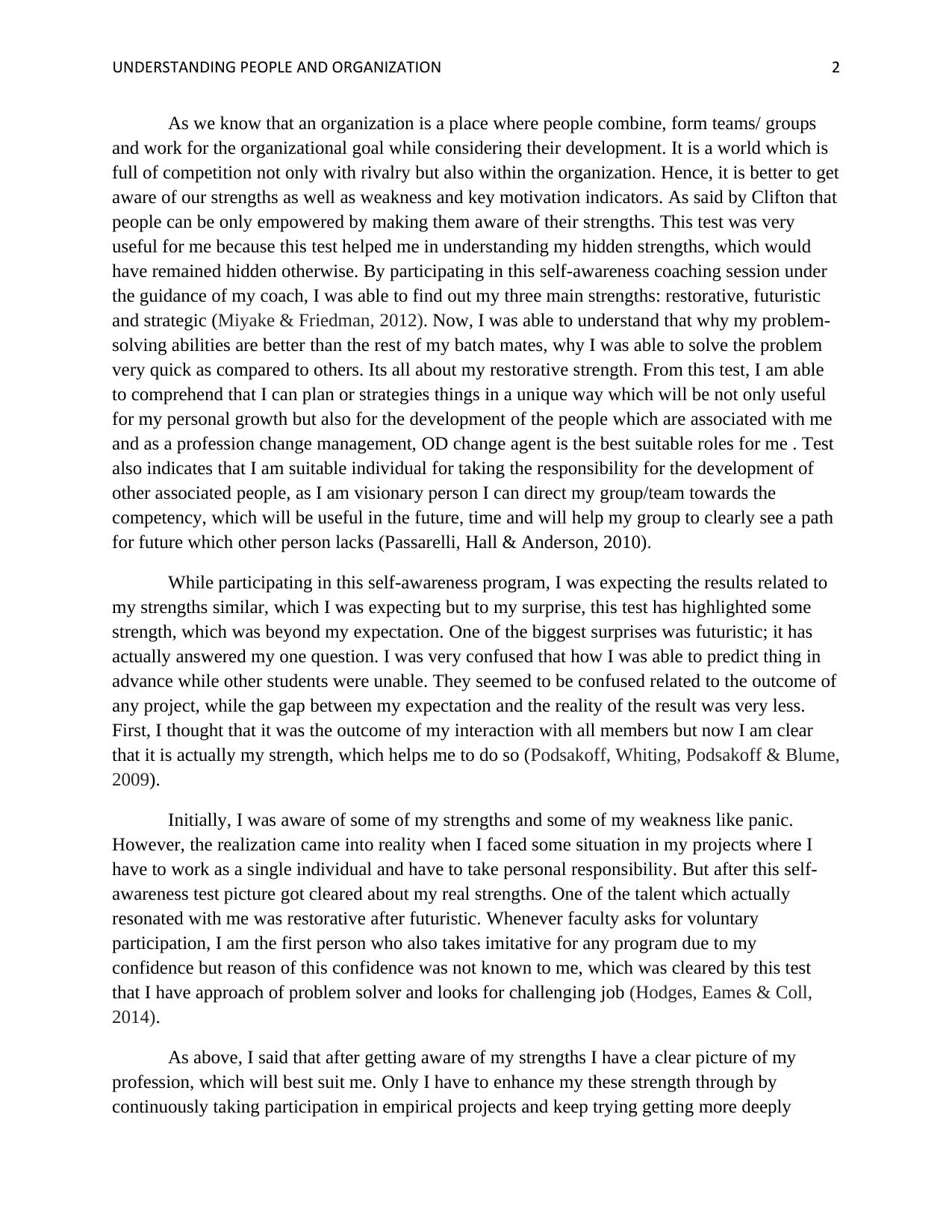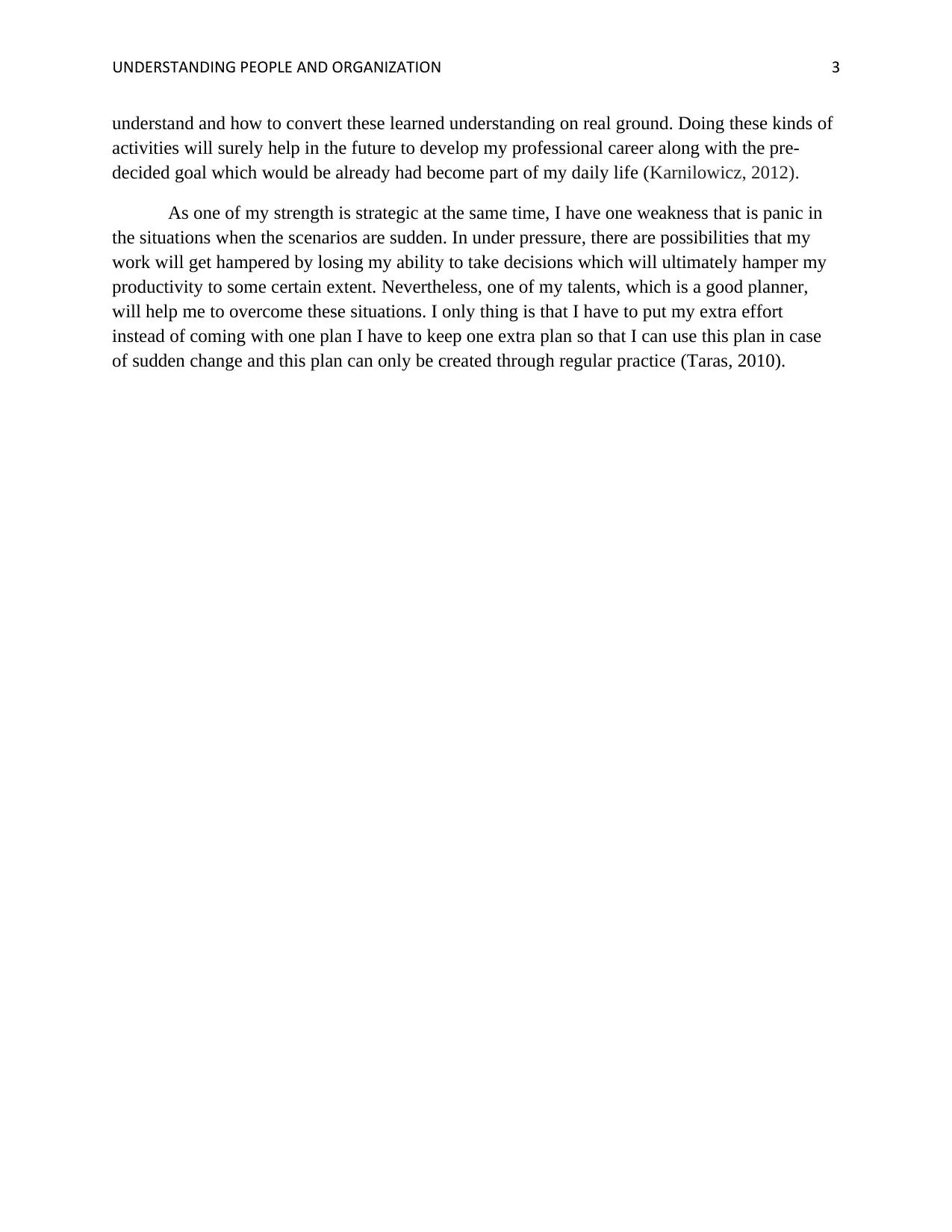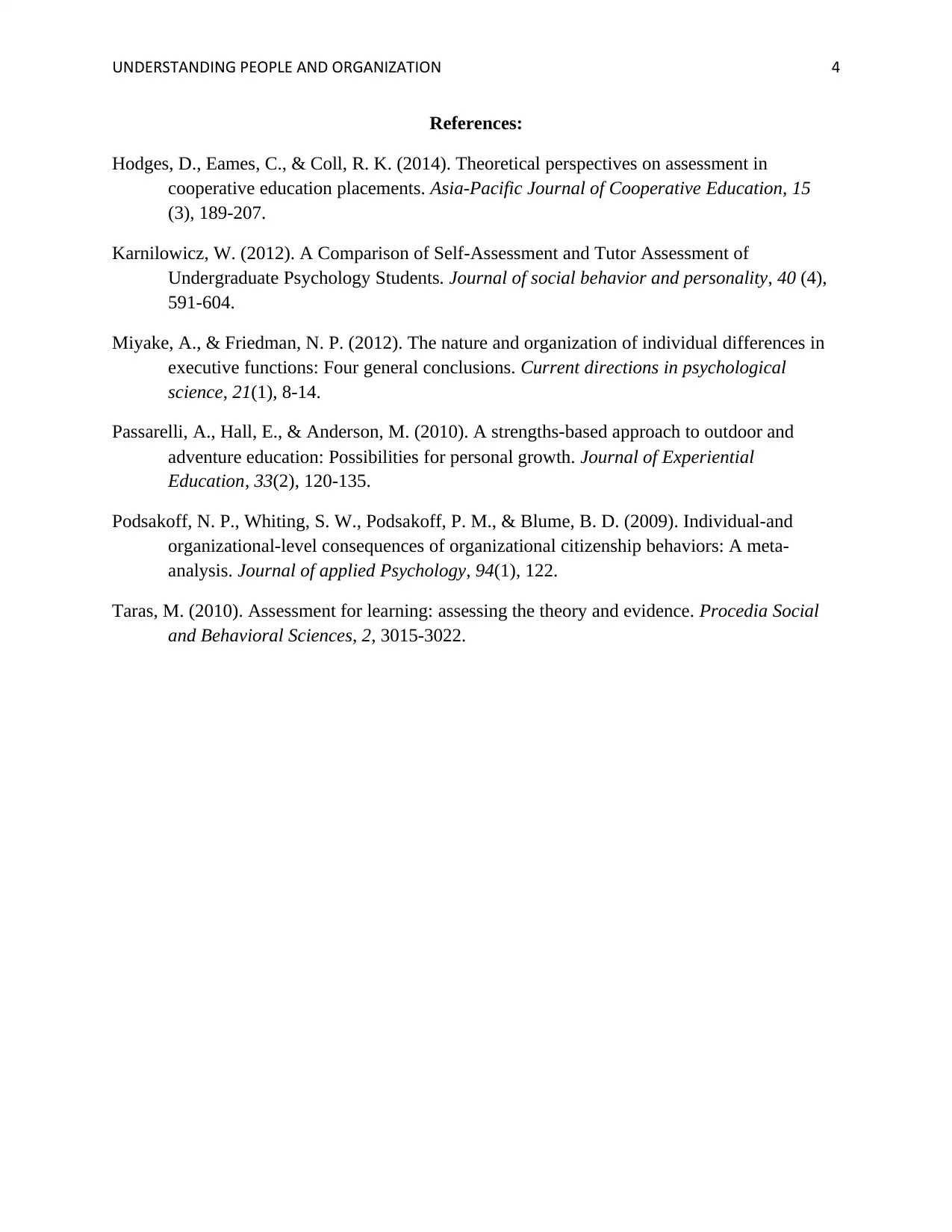BIZ102: Reflective Essay - Gallup Strengths and Self-Awareness
VerifiedAdded on 2023/06/10
|4
|1103
|378
Essay
AI Summary
This reflective essay explores a student's self-awareness journey through the lens of the Gallup Strengths assessment, undertaken as part of the BIZ102 'Understanding People and Organizations' module. The essay details the student's experience with the assessment, the insights gained regarding their strengths (restorative, futuristic, and strategic), and how these strengths influence their approach to problem-solving, planning, and professional aspirations. It also discusses a surprising discovery regarding the student's 'futuristic' strength. Furthermore, the essay addresses the student's weaknesses and the strategies they plan to employ to mitigate them. The student integrates the assessment findings with their understanding of organizational behavior and leadership, referencing academic sources to support their reflections. The essay concludes by highlighting the importance of continuous self-assessment and professional development in achieving predetermined goals.

Running Head: UNDERSTANDING PEOPLE AND ORGANIZATION
Understanding people and organization
Reflective essay
Student name
7/7/2018
Understanding people and organization
Reflective essay
Student name
7/7/2018
Paraphrase This Document
Need a fresh take? Get an instant paraphrase of this document with our AI Paraphraser

UNDERSTANDING PEOPLE AND ORGANIZATION 2
As we know that an organization is a place where people combine, form teams/ groups
and work for the organizational goal while considering their development. It is a world which is
full of competition not only with rivalry but also within the organization. Hence, it is better to get
aware of our strengths as well as weakness and key motivation indicators. As said by Clifton that
people can be only empowered by making them aware of their strengths. This test was very
useful for me because this test helped me in understanding my hidden strengths, which would
have remained hidden otherwise. By participating in this self-awareness coaching session under
the guidance of my coach, I was able to find out my three main strengths: restorative, futuristic
and strategic (Miyake & Friedman, 2012). Now, I was able to understand that why my problem-
solving abilities are better than the rest of my batch mates, why I was able to solve the problem
very quick as compared to others. Its all about my restorative strength. From this test, I am able
to comprehend that I can plan or strategies things in a unique way which will be not only useful
for my personal growth but also for the development of the people which are associated with me
and as a profession change management, OD change agent is the best suitable roles for me . Test
also indicates that I am suitable individual for taking the responsibility for the development of
other associated people, as I am visionary person I can direct my group/team towards the
competency, which will be useful in the future, time and will help my group to clearly see a path
for future which other person lacks (Passarelli, Hall & Anderson, 2010).
While participating in this self-awareness program, I was expecting the results related to
my strengths similar, which I was expecting but to my surprise, this test has highlighted some
strength, which was beyond my expectation. One of the biggest surprises was futuristic; it has
actually answered my one question. I was very confused that how I was able to predict thing in
advance while other students were unable. They seemed to be confused related to the outcome of
any project, while the gap between my expectation and the reality of the result was very less.
First, I thought that it was the outcome of my interaction with all members but now I am clear
that it is actually my strength, which helps me to do so (Podsakoff, Whiting, Podsakoff & Blume,
2009).
Initially, I was aware of some of my strengths and some of my weakness like panic.
However, the realization came into reality when I faced some situation in my projects where I
have to work as a single individual and have to take personal responsibility. But after this self-
awareness test picture got cleared about my real strengths. One of the talent which actually
resonated with me was restorative after futuristic. Whenever faculty asks for voluntary
participation, I am the first person who also takes imitative for any program due to my
confidence but reason of this confidence was not known to me, which was cleared by this test
that I have approach of problem solver and looks for challenging job (Hodges, Eames & Coll,
2014).
As above, I said that after getting aware of my strengths I have a clear picture of my
profession, which will best suit me. Only I have to enhance my these strength through by
continuously taking participation in empirical projects and keep trying getting more deeply
As we know that an organization is a place where people combine, form teams/ groups
and work for the organizational goal while considering their development. It is a world which is
full of competition not only with rivalry but also within the organization. Hence, it is better to get
aware of our strengths as well as weakness and key motivation indicators. As said by Clifton that
people can be only empowered by making them aware of their strengths. This test was very
useful for me because this test helped me in understanding my hidden strengths, which would
have remained hidden otherwise. By participating in this self-awareness coaching session under
the guidance of my coach, I was able to find out my three main strengths: restorative, futuristic
and strategic (Miyake & Friedman, 2012). Now, I was able to understand that why my problem-
solving abilities are better than the rest of my batch mates, why I was able to solve the problem
very quick as compared to others. Its all about my restorative strength. From this test, I am able
to comprehend that I can plan or strategies things in a unique way which will be not only useful
for my personal growth but also for the development of the people which are associated with me
and as a profession change management, OD change agent is the best suitable roles for me . Test
also indicates that I am suitable individual for taking the responsibility for the development of
other associated people, as I am visionary person I can direct my group/team towards the
competency, which will be useful in the future, time and will help my group to clearly see a path
for future which other person lacks (Passarelli, Hall & Anderson, 2010).
While participating in this self-awareness program, I was expecting the results related to
my strengths similar, which I was expecting but to my surprise, this test has highlighted some
strength, which was beyond my expectation. One of the biggest surprises was futuristic; it has
actually answered my one question. I was very confused that how I was able to predict thing in
advance while other students were unable. They seemed to be confused related to the outcome of
any project, while the gap between my expectation and the reality of the result was very less.
First, I thought that it was the outcome of my interaction with all members but now I am clear
that it is actually my strength, which helps me to do so (Podsakoff, Whiting, Podsakoff & Blume,
2009).
Initially, I was aware of some of my strengths and some of my weakness like panic.
However, the realization came into reality when I faced some situation in my projects where I
have to work as a single individual and have to take personal responsibility. But after this self-
awareness test picture got cleared about my real strengths. One of the talent which actually
resonated with me was restorative after futuristic. Whenever faculty asks for voluntary
participation, I am the first person who also takes imitative for any program due to my
confidence but reason of this confidence was not known to me, which was cleared by this test
that I have approach of problem solver and looks for challenging job (Hodges, Eames & Coll,
2014).
As above, I said that after getting aware of my strengths I have a clear picture of my
profession, which will best suit me. Only I have to enhance my these strength through by
continuously taking participation in empirical projects and keep trying getting more deeply

UNDERSTANDING PEOPLE AND ORGANIZATION 3
understand and how to convert these learned understanding on real ground. Doing these kinds of
activities will surely help in the future to develop my professional career along with the pre-
decided goal which would be already had become part of my daily life (Karnilowicz, 2012).
As one of my strength is strategic at the same time, I have one weakness that is panic in
the situations when the scenarios are sudden. In under pressure, there are possibilities that my
work will get hampered by losing my ability to take decisions which will ultimately hamper my
productivity to some certain extent. Nevertheless, one of my talents, which is a good planner,
will help me to overcome these situations. I only thing is that I have to put my extra effort
instead of coming with one plan I have to keep one extra plan so that I can use this plan in case
of sudden change and this plan can only be created through regular practice (Taras, 2010).
understand and how to convert these learned understanding on real ground. Doing these kinds of
activities will surely help in the future to develop my professional career along with the pre-
decided goal which would be already had become part of my daily life (Karnilowicz, 2012).
As one of my strength is strategic at the same time, I have one weakness that is panic in
the situations when the scenarios are sudden. In under pressure, there are possibilities that my
work will get hampered by losing my ability to take decisions which will ultimately hamper my
productivity to some certain extent. Nevertheless, one of my talents, which is a good planner,
will help me to overcome these situations. I only thing is that I have to put my extra effort
instead of coming with one plan I have to keep one extra plan so that I can use this plan in case
of sudden change and this plan can only be created through regular practice (Taras, 2010).
⊘ This is a preview!⊘
Do you want full access?
Subscribe today to unlock all pages.

Trusted by 1+ million students worldwide

UNDERSTANDING PEOPLE AND ORGANIZATION 4
References:
Hodges, D., Eames, C., & Coll, R. K. (2014). Theoretical perspectives on assessment in
cooperative education placements. Asia-Pacific Journal of Cooperative Education, 15
(3), 189-207.
Karnilowicz, W. (2012). A Comparison of Self-Assessment and Tutor Assessment of
Undergraduate Psychology Students. Journal of social behavior and personality, 40 (4),
591-604.
Miyake, A., & Friedman, N. P. (2012). The nature and organization of individual differences in
executive functions: Four general conclusions. Current directions in psychological
science, 21(1), 8-14.
Passarelli, A., Hall, E., & Anderson, M. (2010). A strengths-based approach to outdoor and
adventure education: Possibilities for personal growth. Journal of Experiential
Education, 33(2), 120-135.
Podsakoff, N. P., Whiting, S. W., Podsakoff, P. M., & Blume, B. D. (2009). Individual-and
organizational-level consequences of organizational citizenship behaviors: A meta-
analysis. Journal of applied Psychology, 94(1), 122.
Taras, M. (2010). Assessment for learning: assessing the theory and evidence. Procedia Social
and Behavioral Sciences, 2, 3015-3022.
References:
Hodges, D., Eames, C., & Coll, R. K. (2014). Theoretical perspectives on assessment in
cooperative education placements. Asia-Pacific Journal of Cooperative Education, 15
(3), 189-207.
Karnilowicz, W. (2012). A Comparison of Self-Assessment and Tutor Assessment of
Undergraduate Psychology Students. Journal of social behavior and personality, 40 (4),
591-604.
Miyake, A., & Friedman, N. P. (2012). The nature and organization of individual differences in
executive functions: Four general conclusions. Current directions in psychological
science, 21(1), 8-14.
Passarelli, A., Hall, E., & Anderson, M. (2010). A strengths-based approach to outdoor and
adventure education: Possibilities for personal growth. Journal of Experiential
Education, 33(2), 120-135.
Podsakoff, N. P., Whiting, S. W., Podsakoff, P. M., & Blume, B. D. (2009). Individual-and
organizational-level consequences of organizational citizenship behaviors: A meta-
analysis. Journal of applied Psychology, 94(1), 122.
Taras, M. (2010). Assessment for learning: assessing the theory and evidence. Procedia Social
and Behavioral Sciences, 2, 3015-3022.
1 out of 4
Related Documents
Your All-in-One AI-Powered Toolkit for Academic Success.
+13062052269
info@desklib.com
Available 24*7 on WhatsApp / Email
![[object Object]](/_next/static/media/star-bottom.7253800d.svg)
Unlock your academic potential
Copyright © 2020–2026 A2Z Services. All Rights Reserved. Developed and managed by ZUCOL.




